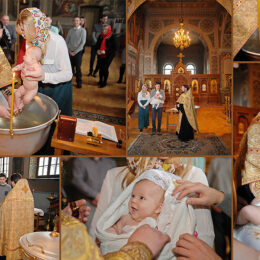The word “Lent,” now associated exclusively with the observance of the liturgical year, originally meant “spring” and had no directly religious significance. In English usage, however, its reference was gradually limited to the season of preparation for Pascha, a season that does, in fact, coincide with spring.
In languages dependent on Latin, the word for Lent is some variant of “forty,” derived from the Latin *quadragesima*. This is a period of forty days of fasting in imitation of the Lord himself, who observed exactly that length of time in fasting prior to the beginning of his earthly ministry. Lent is also associated with the forty day fasts of Moses, on Mount Sinai, and of Elijah, as he journeyed to that same mountain. Doubtless it was this combination of Jesus, Moses, and Elijah together on the mountain of Transfiguration that prompted many believers to read that Gospel story near the beginning of Lent.
As early as the second century we already find Pascha being the preferred time for the baptism of new Christians. The reasons for this preference are pretty obvious. It is in the Sacrament of Baptism, after all, that Christians are mystically buried and rise with Christ (cf. Romans 6:4; Colossians 2:12). Baptism is intrinsically Paschal.
Modern Christians, many not overly fond of fasting, may wonder why a period of fasting should precede Baptism. The reason was obvious to the ancients. After all, even the Apostle Paul prayed and fasted for 3 days prior to being baptized (Acts 9:9,11,18). In *The Teaching of the Twelve Apostles* (*Didache*), a work from Syria to be dated before A.D. 100, there is the prescription that says: “Prior to Baptism, both he who is baptizing and he who is being baptized should fast, along with any others who can. And be sure that the one who is to be baptized fasts for one or two days beforehand” (7.4). One notes in this context that this fasting is a sort of joint or community effort, involving more than the personal devotion of the one being baptized. This was definitely not a “private fast.”
That communal aspect of the pre-baptismal fasting is even clearer in another text written a half-century or so later. Crafting a defense of the Christians to the Roman Emperor, the Christian apologist Justin described how newcomers to the faith went about getting themselves baptized: “As many as are persuaded and believe that what we teach and say is true, and undertake to live accordingly, are instructed to pray and entreat God with fasting, for the remission of their past sins, while we pray and fast with them. Then they are brought by us to where there is water, and are regenerated in the same manner in which we were ourselves regenerated” (*First Apology* 61). Composed in Rome, this text also proves that the pre-baptismal fast by Christian congregations was not a practice limited to Syria.
Indeed, within the next half-century we find that discipline referred to in North Africa. In chapter 20 of his treatise *On Baptism*, the Christian apologist Tertullian remarked: “They who are about to be baptized ought to pray with repeated prayers, fasts and bending of the knee, and vigils all the night through, along with the confession of all their prior sins.” He does not explicitly say that the fasting period should last forty days, but he does link it to the forty fast of Jesus recorded in the Gospels.
Gradually, however, the Christian Church did settle on a period of 40 days, and the custom was so firmly in place by year 325 that the Council of Nicaea, the same council that definitively fixed the canon of the New Testament, also determined that the forty days preceding Easter should be a special time of prayer and fasting in preparation for the baptisms to be done on that day. Such were the origins of the season of Lent, which Christians from the 4th century onwards were very convinced were rooted in the time and teaching of the Apostles themselves.
The fasting observed during this season is not, needless to say, total. Over the centuries it especially came to mean simply a tougher, more disciplined diet, excluding more ‘substantial’ foods like meat and dairy products. Such fasting is accompanied by other practices of restraint, to encourage concentration on the things of God and the health of the soul, such as prayer and the study of Holy Scripture.




Yesterday’s liturgy was closed out with the Service of Forgiveness, so that we could set out on our Lenten journey by asking for forgiveness from our neighbors.
To continue the Service of Forgiveness in which I took part yesterday, to whomever is reading this comment: Forgive me a Sinner. May God forgive us both.
Daniel, and all the other bloggers here, God forgives. Forgive me a sinner.
I beg forgiveness as well. My passion for my beliefs sometimes results in comments that are belligerent and inconsistent with Christian fellowship. My sin has been to take the anger I feel over certain political developments and current events and direct that anger at other people. This was wrong.
While I may disagree with the comments of others on this site there isn’t a single person who I disagreed with on this site who isn’t a good and decent person motivated by a sincere desire for a better, Christian world.
Of one thing I am sure, God Forgives! No other attribute of God is a fundamental to salvation as His forgiveness, even His justice lies in His forgiveness as He forgives all who ask without question. Only those who do not ask and accept His freely given mercy are left unjustified. Forgiveness and the Cross are inextricably linked. The Cross is the avenue of forgiveness both at His Crucifixion and now for us.
Forgive me a sinner.
As we begin Lent here is an inspring story of God’s love trimphing over evil:
“Hostage’s Past May Have Helped Win Captor’s Trust”
http://www.nytimes.com/2005/03/16/national/16ashley.html?adxnnl=1&adxnnlx=1110992456-C9/08Edpa0trRZEvgvYw9w
“ATLANTA, March 15 – When a fugitive accused of courthouse killings jabbed a gun at Elizabeth Ashley Smith, forced her inside her apartment and bound her in the bathtub, she did what she said her religious faith had taught her to do. She talked with him as one hurting soul to another.
Now, with the fugitive having surrendered at Ms. Smith’s urging, her story has become an instant classic of sin, redemption and grace.
That Ms. Smith was herself trying to overcome a checkered past only enhanced her status as an inspirational heroine, in particular for people who have embraced her story as a testimony to religious faith.”